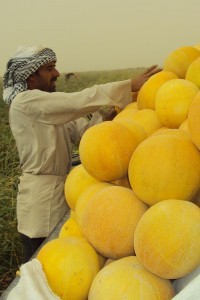
Melons are big in Diwaniyah governorate and getting bigger, thanks to the USAID-Inma Agribusiness Program.
The governorate is one of the major melon producing are-as in the country where farmers plant more than an esti-mated 16,000 donums of melon annually. However, before 2010, only local varieties were grown there, which produced low yields – approximately 2.5 metric tons per donum. These yields were well below the international average of four metric tons per donum.
That same year, USAID-Inma conducted an analysis of melon production and concluded that high-yielding, high quality cantaloupe varieties could be grown and potentially have a higher profitability than tomato, eggplant, and cucumber.
USAID-Inma assisted four farmers to each plant 10 donum demonstration plots of four varieties of hybrid melons. Large, sweet, early maturing varieties were selected, which could hit the market 15 days before the later maturing local varieties. USAID-Inma also provided technical assistance in training the farmers on new growing techniques and methods to help boost production.
The new practices and varieties resulted in higher yields averaging 5 metric tons per donum, with fruits averaging 3 kilograms each, while local fruits average 1.3 kg each. Profitability for the demonstration plots averaged $330 per donum compared to $100 per donum for local varieties.
Iraqi Ministry of Agriculture recorded that 80 Diwaniyah farmers planted 700 donums of the new melon varieties in 2011. This is a twenty-fold increase over the 40 donum demonstration plots of 2010. USAID-Inma also facilitated connecting the seed supply company Hamza Al Tamim to international sources of hybrid melon seed, addressing one of the main constraints to quality melon production in Iraq.







Comment
Make a general inquiry or suggest an improvement.